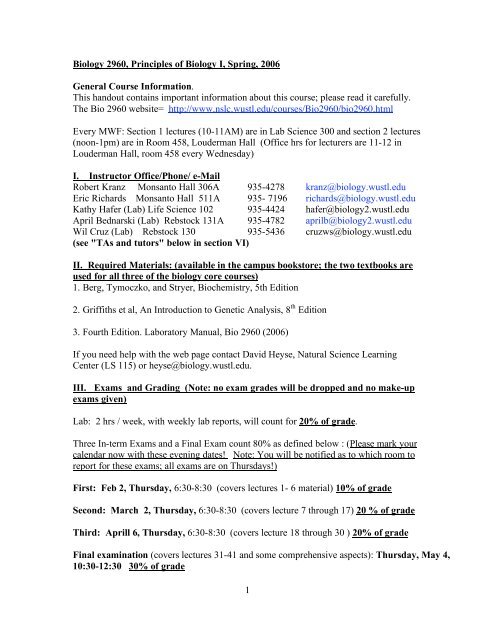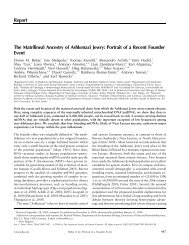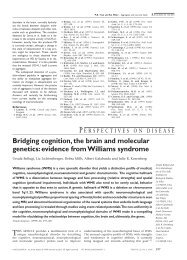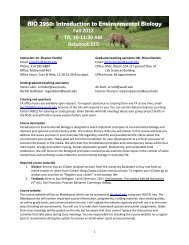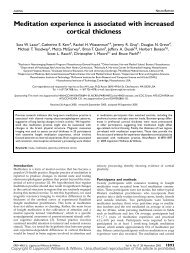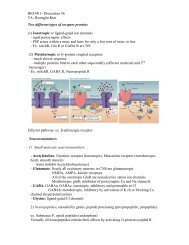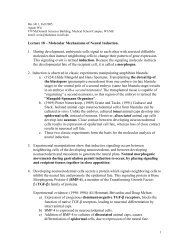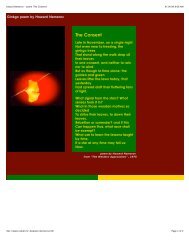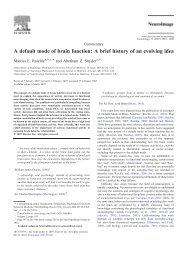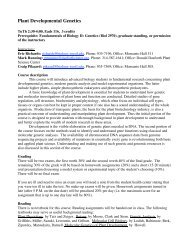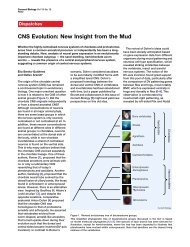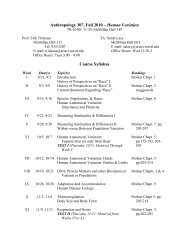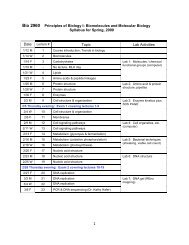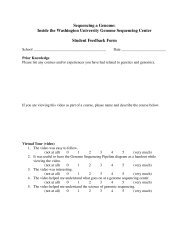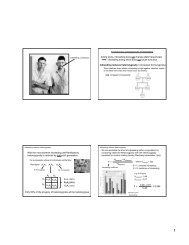1 Biology 2960, Principles of Biology I, Spring, 2006 General Course ...
1 Biology 2960, Principles of Biology I, Spring, 2006 General Course ...
1 Biology 2960, Principles of Biology I, Spring, 2006 General Course ...
You also want an ePaper? Increase the reach of your titles
YUMPU automatically turns print PDFs into web optimized ePapers that Google loves.
<strong>Biology</strong> <strong>2960</strong>, <strong>Principles</strong> <strong>of</strong> <strong>Biology</strong> I, <strong>Spring</strong>, <strong>2006</strong><br />
<strong>General</strong> <strong>Course</strong> Information.<br />
This handout contains important information about this course; please read it carefully.<br />
The Bio <strong>2960</strong> website= http://www.nslc.wustl.edu/courses/Bio<strong>2960</strong>/bio<strong>2960</strong>.html<br />
Every MWF: Section 1 lectures (10-11AM) are in Lab Science 300 and section 2 lectures<br />
(noon-1pm) are in Room 458, Louderman Hall (Office hrs for lecturers are 11-12 in<br />
Louderman Hall, room 458 every Wednesday)<br />
I. Instructor Office/Phone/ e-Mail<br />
Robert Kranz Monsanto Hall 306A 935-4278 kranz@biology.wustl.edu<br />
Eric Richards Monsanto Hall 511A 935- 7196 richards@biology.wustl.edu<br />
Kathy Hafer (Lab) Life Science 102 935-4424 hafer@biology2.wustl.edu<br />
April Bednarski (Lab) Rebstock 131A 935-4782 aprilb@biology2.wustl.edu<br />
Wil Cruz (Lab) Rebstock 130 935-5436 cruzws@biology.wustl.edu<br />
(see "TAs and tutors" below in section VI)<br />
II. Required Materials: (available in the campus bookstore; the two textbooks are<br />
used for all three <strong>of</strong> the biology core courses)<br />
1. Berg, Tymoczko, and Stryer, Biochemistry, 5th Edition<br />
2. Griffiths et al, An Introduction to Genetic Analysis, 8 th Edition<br />
3. Fourth Edition. Laboratory Manual, Bio <strong>2960</strong> (<strong>2006</strong>)<br />
If you need help with the web page contact David Heyse, Natural Science Learning<br />
Center (LS 115) or heyse@biology.wustl.edu.<br />
III. Exams and Grading (Note: no exam grades will be dropped and no make-up<br />
exams given)<br />
Lab: 2 hrs / week, with weekly lab reports, will count for 20% <strong>of</strong> grade.<br />
Three In-term Exams and a Final Exam count 80% as defined below : (Please mark your<br />
calendar now with these evening dates! Note: You will be notified as to which room to<br />
report for these exams; all exams are on Thursdays!)<br />
First: Feb 2, Thursday, 6:30-8:30 (covers lectures 1- 6 material) 10% <strong>of</strong> grade<br />
Second: March 2, Thursday, 6:30-8:30 (covers lecture 7 through 17) 20 % <strong>of</strong> grade<br />
Third: Aprill 6, Thursday, 6:30-8:30 (covers lecture 18 through 30 ) 20% <strong>of</strong> grade<br />
Final examination (covers lectures 31-41 and some comprehensive aspects): Thursday, May 4,<br />
10:30-12:30 30% <strong>of</strong> grade<br />
1
In-term Exams: Reserve the exam evenings noted above (If you are<br />
participating in varsity sports notify your coach now <strong>of</strong> these dates, and<br />
have the coaches contact the pr<strong>of</strong>essors immediately, at the beginning <strong>of</strong> the<br />
semester. No requests will be considered that are submitted less than two weeks prior to<br />
an exam. No allowances will be made for students participating in<br />
student-run or student-sponsored events, regardless <strong>of</strong> the purpose) NO<br />
MAKE-UP EXAMS WILL BE GIVEN AND NO EXAM GRADES WILL BE<br />
DROPPED. THEREFORE, DO NOT SCHEDULE ANY CONFLICTS FOR THE<br />
EVENINGS OF EXAMS.<br />
Grading and Regrades: Exams are graded by separate PhD students that are not TAs<br />
for the course, with each grading the same question(s) for all students, thus assuring<br />
consistency. Any tabulation errors for exams should be brought to the attention <strong>of</strong> Dr.<br />
Hafer by the regrade deadline (see below). For reevaluation <strong>of</strong> one <strong>of</strong> your answers from<br />
any exam, the following procedure must be undertaken:<br />
If you have a clear-cut request, you must return the entire exam with a thorough,<br />
typed regrade request that includes the rationale and justification for your request (with a<br />
citation/page number from the text, if appropriate). This written request is returned to Dr.<br />
Hafer stapled to the exam by the Friday (4pm) after your exam is returned. We will keep<br />
this on file until the end <strong>of</strong> the semester and if such a regrade might impact your<br />
letter grade, it will be reevaluated at that time (the whole exam will be regraded ).<br />
Remember to make a copy <strong>of</strong> your exam for yourself as a study tool for the final exam.<br />
This regrade procedure is printed on the cover page <strong>of</strong> each exam.<br />
IV.Discussion/Problem sessions:<br />
Problem Sets: Problem sets will generally be posted on the web the week before each set<br />
<strong>of</strong> sessions. Lecture topics specifically relevant to each problem set will be so indicated.<br />
These are an important study tool, providing problems similar to some <strong>of</strong> those that you<br />
will see on the exams. You should be prepared to discuss the problem set in discussion<br />
sessions.<br />
Discussion / problem sessions, all 7-9pm (All sessions are in Rebstock Hall room<br />
215), (Note: each <strong>of</strong> the back-to-back sessions will be the same and the purpose is to take<br />
questions and cover the problem sets ).<br />
Jan 30, Jan 31, Feb 1 (Mon, Tues, Wed): each identical covering lecture topics 1-6.<br />
Feb 13, Feb 14 (Mon, Tues): each identical covering lecture topics 7-11.<br />
Feb 28, March 1 ( Tues, Wed): each identical covering lecture topics 12-17.<br />
March 23, March 26 (Thur, Sun): each identical covering lecture topics 18-23.<br />
April 4, April 5 (Tues, Wed): each identical covering lecture topics 24-29.<br />
2
April 18, April 19 (Tues, Wed): each identical covering lecture topics 30-35.<br />
May 2, May 3 (Tues, Wed): each identical covering lecture topics 36-41.<br />
V. Lab Sessions.<br />
You should have already signed up for a Lab section. If you are wait-listed for the section<br />
<strong>of</strong> your choice, you need to make another selection. Changes may be made on the<br />
University computer system until 4 PM, Thursday, January 19. After that time, you must<br />
see Dr. Hafer (Life Sciences 102) to change sections. The deadline for switching sections<br />
is 4 pm Tuesday, Jan 31.<br />
Attendance at Lab Sessions is Required. You are required to turn in lab reports<br />
and cannot turn in a report for a lab session you missed. You must attend the session for<br />
which you are registered; no credit will be given for lab work done in sessions other than<br />
the one in which you are registered. NO MAKE-UP LABS ARE ALLOWED. All<br />
students can drop one lab report grade, so there is no penalty for missing one lab session<br />
during the semester.<br />
VI. Lecture teaching assistants (TAs) and undergraduate tutors. A<br />
number <strong>of</strong> resources are available for one-on-one help or as small<br />
groups. The TAs will be running each <strong>of</strong> the Discussion/problem<br />
sessions, assisting in the design <strong>of</strong> course materials, and in holding<br />
<strong>of</strong>fice hours for assistance.<br />
Lecture TA contact info.<br />
Six graduate TAs ( contact info )<br />
The following TAs will be leading discussion sessions and <strong>of</strong>fice hrs for the first half<br />
<strong>of</strong> the course(Jan 18- March 3):<br />
Pazolli Mira epazolli@artsci.wustl.edu<br />
Flessner Lauren lbflessn@artsci.wustl.edu<br />
Schepker Jessie jaschepk@artsci.wustl.edu<br />
The following TAs will be leading discussion sessions and <strong>of</strong>fice hrs for the second<br />
half <strong>of</strong> the course (March 6- May 4):<br />
Nicholson Tracy tFnichoL@artsci.wustl.edu<br />
Zhang Don zhangd@msnotes.wustl.edu<br />
Campbell Jessea jacampb@artsci.wustl.edu<br />
3
Office hrs and location for each <strong>of</strong> the lecture TAs will be designated in a separate<br />
document on the Bio <strong>2960</strong> website. Office hrs will be each week there is an exam and<br />
by appointment.<br />
Tutors (for individual and group tutoring) are available free <strong>of</strong> charge. If you need<br />
an undergraduate tutor, who has already taken similar coursework, contact Dr.<br />
Kathy Hafer in person or via email (hafer@biology2.wustl.edu). Students working<br />
with tutors are expected to meet regularly with the tutor.<br />
VII. Lectures and Assigned Readings: Lectures will parallel but typically not duplicate,<br />
the treatment in the assigned readings in the texts. The lecturer will assume that you have<br />
read the assigned material prior to class. Failure to do the reading in advance may lead to<br />
difficulty in following the lectures. Some topics from the text readings will not be<br />
covered in lectures but you are still responsible. All lectures will be videotaped and will<br />
be available for review in the <strong>Biology</strong> Library and at http://eres.wustl.edu or via a link<br />
from the Bio <strong>2960</strong> website; these tapes should be used for review, not in place <strong>of</strong><br />
attendance at live lectures.<br />
Occasionally, outside readings will be selected to emphasize discovery- how we came to<br />
know what we think we know. These readings will be available on the Bio <strong>2960</strong> web site.<br />
Note that the web site is intended for use by the members <strong>of</strong> this class only, and is<br />
password protected. Our permission to use these papers and other materials has been<br />
granted on this condition; please respect this fact, and do not transfer material to an<br />
unprotected site.<br />
Classroom Handouts. There will be no classroom handouts. Key figures used in the<br />
lectures will be available on the website before each lecture; therefore printing these<br />
out prior to each lecture will aid in following each lecture.<br />
VIII. Academic Integrity: We encourage you to form study groups, and to work<br />
together in analyzing the text and readings, solving the problem sets, etc. However, the<br />
work that you turn in (lab notebooks, exams) should be your work alone. For example,<br />
while in lab you should discuss the questions with your lab partner(s), gather and share<br />
your data, but then sit down and write your own lab report yourself. All lab reports and<br />
exams, whether take-home or in class, should be your own work.<br />
IX. REVIEWING BIOLOGY <strong>2960</strong> LECTURES<br />
Problems with ERes and the streaming lectures should be reported to<br />
eres@library.wustl.edu . Last year, they were typically fixed within hrs <strong>of</strong> reporting.<br />
Recordings should be used for review in addition to attending lectures and not in the<br />
place <strong>of</strong> lecture attendance. Experience has shown that students who rely on recorded<br />
lectures may have suboptimal performance on exams. Also quality is not guaranteed;<br />
each semester 1-2 lectures have some sound and/or video problems.<br />
VHS videotapes are available in the <strong>Biology</strong> Library (usually late afternoon each lecture<br />
day). Viewing while the library is open. First come/first served Sign out on log<br />
4
sheet/wait list at desk and use video players in library OR get 2-hour loan from desk and<br />
use video players in NSLC or elsewhere .<br />
Direct links thru the Bio <strong>2960</strong> website. On the web at http://eres.wustl.edu.<br />
Username and password will be available from your instructor. IP protected - use a<br />
workstation on W.U. campus or use the proxy server [see<br />
http://library.wustl.edu/about/access.html]. Workstations available in <strong>Biology</strong> Library,<br />
NSLC, and many campus computer labs. For plug-in information for your own<br />
computers, see the online help pages.<br />
5


